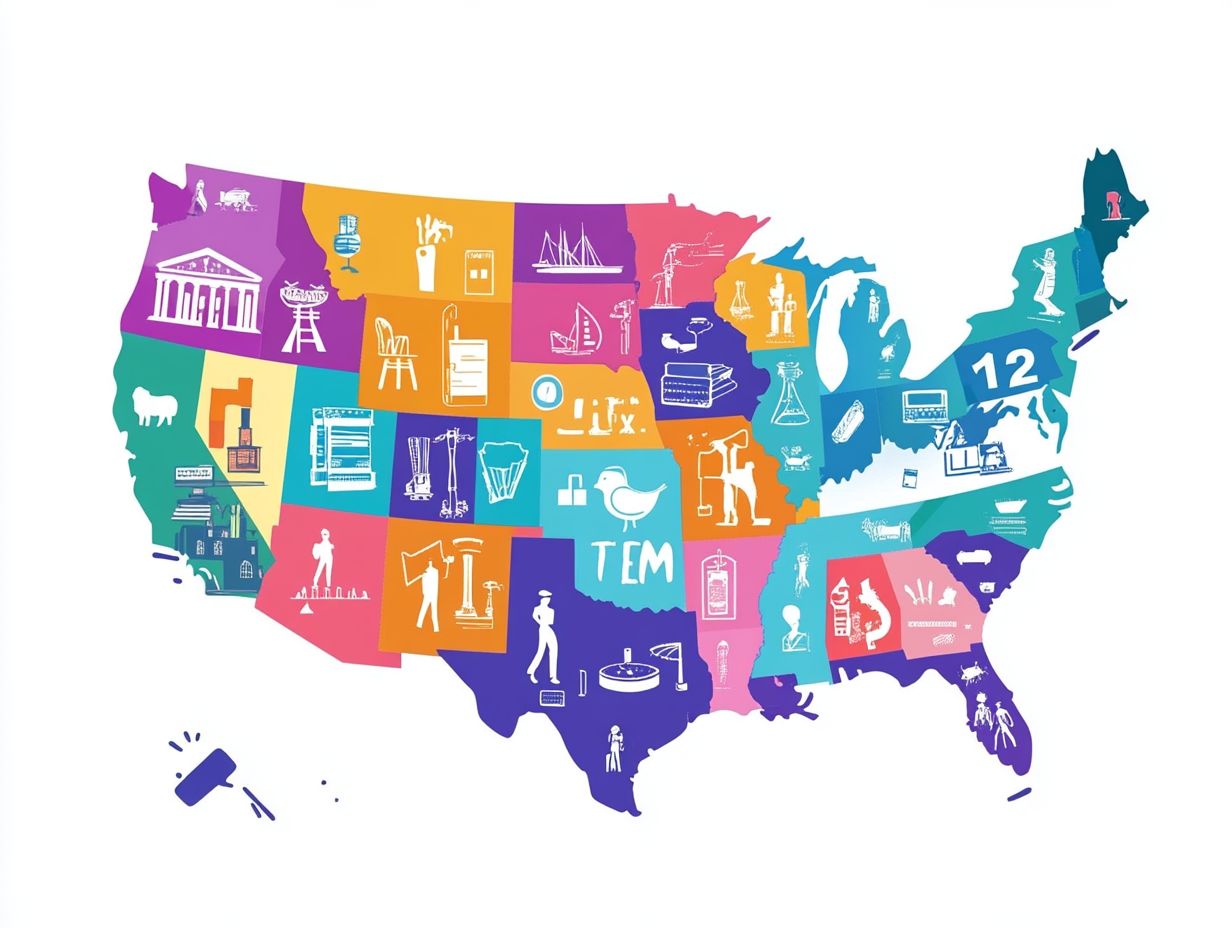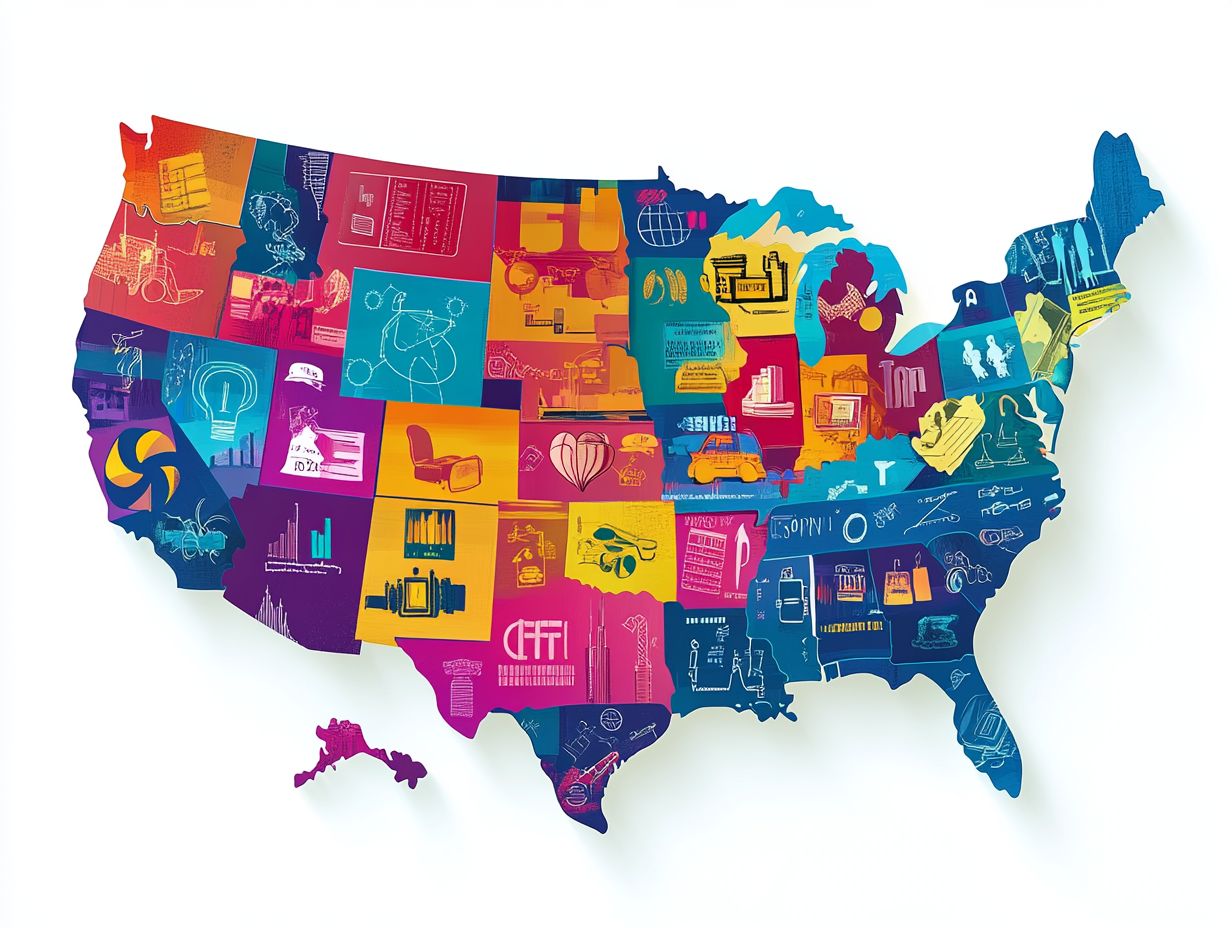Tax Considerations for Freelancers in Different States
Navigating state taxes as a freelancer can feel overwhelming. However, understanding state-specific laws is crucial for maximizing your earnings.
This guide provides an overview of state tax regulations and highlights deductions tailored to your unique situation. It addresses essential filing requirements, offers tips for minimizing your liabilities, and directs you to valuable resources for ongoing support.
Whether you’re just starting or looking to refine your tax strategy, this comprehensive guide ensures you’re well-equipped for success.
Contents
- Key Takeaways:
- Understanding the Basics
- State Tax Considerations for Freelancers
- State-Specific Tax Deductions for Freelancers
- State Tax Filing Requirements for Freelancers
- State Tax Tips for Freelancers
- State Tax Resources for Freelancers
- Frequently Asked Questions
- Tax Considerations for Freelancers
- Do I Have to Pay State Taxes If I Am a Freelancer in Multiple States?
- How Do I Determine Which State I Owe Taxes To as a Freelancer?
- Can I Deduct Business Expenses in All the States Where I Pay Taxes, and What About Retirement Planning Options Like SEP IRA or SIMPLE IRA?
- What Happens If I Fail to Pay State Taxes as a Freelancer?
- Are There Any Special Tax Considerations for Freelancers in Different States?
Key Takeaways:

- Understand the basics of state taxes as a freelancer, including important deadlines and available deductions.
- Each state has its own tax laws and deductions, making it crucial for freelancers to research their specific state’s requirements.
- Maximize deductions and minimize tax liabilities by taking advantage of state-specific tax tips and resources for freelancers.
Understanding the Basics
Understanding the basics of freelancing is essential for independent workers. You must know how to report your income and maximize your deductions effectively.
It s important to understand your obligations, including estimated taxes and quarterly payments to the IRS. Additionally, be aware of how these affect your Social Security and Medicare contributions.
This foundational knowledge enables you to manage your finances effectively and stay compliant with federal tax regulations.
State Tax Considerations for Freelancers
State tax considerations are crucial for freelancers as they navigate taxation across various levels. You need to be aware of your specific state tax laws, which can vary significantly from federal requirements set by the IRS.
Understanding state-specific tax deductions and filing obligations is essential for effective tax planning and compliance.
Overview of State Tax Laws
State tax laws can vary dramatically across the U.S., impacting freelancers depending on their residence and work location. These laws dictate how you report income, pay taxes, and claim deductions, making them critical for adhering to both state and federal guidelines.
Each state has unique requirements concerning income thresholds, allowable deductions, and tax rates. For instance, operating in California may have very different obligations compared to freelancing in Texas, which has no state income tax. To navigate these complexities effectively, new freelancers can benefit from tax planning tips for new freelancers.
Familiarizing yourself with local tax codes can significantly influence your financial health; missteps could lead to penalties or unexpected liabilities. Leveraging resources like state revenue departments and legal advisors can help you navigate these complexities, ensuring you’re well-informed about what to know about sales tax as a freelancer throughout your freelance journey.
State-Specific Tax Deductions for Freelancers

State-specific tax deductions offer substantial financial relief for freelancers. By understanding the deductions available at the state level, you can effectively lower your taxable income.
This knowledge not only helps you optimize your finances but also ensures compliance with IRS guidelines when reporting income, especially for home office expenses. For freelancers, understanding taxable income is crucial.
Available Deductions and How to Claim Them
Freelancers like you can tap into a wealth of deductions, including home office expenses, which can significantly impact your overall tax liability. To claim these deductions effectively, it s crucial to maintain accurate records and understand the specific guidelines set by the IRS (Internal Revenue Service) for self-employed individuals.
By keeping detailed documentation of workspace expenses such as utility bills, internet costs, and office supplies, you can maximize your savings when tax season arrives. It’s also wise to familiarize yourself with what every freelancer should know about taxes, including valuable deductions like vehicle expenses, health insurance premiums, and retirement contributions, all of which can further lighten your taxable income.
Understanding IRS regulations not only enhances your compliance but also helps you navigate the often complex tax landscape with confidence. Therefore, diligently tracking all your income and expenses, supported by receipts and invoices, allows you to make informed claims and capitalize on the benefits available to you.
State Tax Filing Requirements for Freelancers
State tax filing requirements for freelancers can be quite complex and differ significantly from one state to another. This complexity requires a thorough understanding of the relevant tax forms and deadlines to ensure compliance.
As a freelancer, it’s imperative to be detailed in fulfilling both state and federal filing obligations, which includes accurately completing the specific tax forms dictated by the IRS. To better navigate this landscape, consider these tax tips for freelancers in the gig economy.
Important Deadlines and Forms
Important deadlines and tax forms are vital for freelancers to meet state tax filing requirements effectively. This helps you avoid potential penalties or interest charges. It’s essential to be aware of the specific forms required by both your state and the IRS, as well as submission deadlines, to ensure compliance.
Each state has its own regulations that can vary, so staying informed about local tax deadlines is crucial. Typically, estimated tax payments are due quarterly. For freelancers, especially those working abroad, following tax tips for freelancers who work abroad can help you navigate these complexities. Don’t let missed deadlines cost you! Stay on top of your tax filings to avoid fines.
By keeping track of forms like the Schedule C for income reporting, along with any state-specific documents, you can file accurately and punctually. Understanding these requirements and the tax implications of freelance side hustles helps you avoid costly mistakes and grants you peace of mind, knowing you are fulfilling your obligations responsibly.
State Tax Tips for Freelancers

State tax tips for freelancers are essential tools in navigating the complex landscape of self-employment taxes. By leveraging these insights, you can significantly cut down on your tax bills while maximizing your deductions.
Equipped with the right strategies and a solid understanding of IRS regulations, you’ll find yourself adeptly managing your tax responsibilities, especially when considering the tax implications of freelance income vs. employment, ultimately enhancing your financial well-being.
Maximizing Deductions and Minimizing Liabilities
Maximizing deductions and minimizing liabilities are essential practices for freelancers, helping you maintain optimal financial health while staying compliant with IRS regulations. Understanding various tax strategies allows you to effectively reduce your taxable income and keep more of your hard-earned money.
To achieve this, it’s crucial to keep detailed records of all business-related expenses, which can include everything from home office costs to travel expenditures and professional services. For example, if you work from a dedicated home office, claiming a portion of your housing expenses could yield substantial savings.
Consulting a tax professional who specializes in freelance services can be beneficial. They can provide tailored advice on maximizing deductions, such as those related to equipment purchases and health insurance premiums, ensuring you take full advantage of available tax benefits.
Start organizing your tax documents today to save big this tax season!
State Tax Resources for Freelancers
State tax resources for freelancers are essential tools that offer you valuable insights and support regarding your tax obligations and compliance.
Utilizing these resources helps you understand the details of both state and IRS regulations, ensuring you remain informed and compliant with your tax responsibilities.
Where to Find Help and Additional Information
Finding reliable help is crucial for freelancers like you as you navigate your tax obligations and benefits related to state taxes. A wealth of state tax resources, including government websites and professional organizations, is available to provide the guidance and support necessary for IRS compliance.
Leverage these resources to uncover insights on deductions, credits, and specific state requirements tailored to your unique circumstances. Official websites like the IRS page and state tax department sites frequently offer up-to-date information and downloadable forms to streamline your process. Additionally, if you’re interested in freelancing while traveling, understanding the tax implications is crucial.
Organizations like the American Institute of Professional Bookkeepers host webinars and online forums. You can connect with tax experts and fellow freelancers there. Additionally, check out the freelancer’s guide to state-specific tax regulations for more tailored information. Engage with social media groups dedicated to freelancing for invaluable peer support and shared experiences. This can transform tax season from a daunting challenge into a more manageable endeavor.
Frequently Asked Questions

Tax Considerations for Freelancers
As a freelancer, you are required to pay taxes in the state where you live and work. You must report your income and pay state income taxes in your state of residence and any other state where you earned income.
Do I Have to Pay State Taxes If I Am a Freelancer in Multiple States?
Yes, as a freelancer working in multiple states, you are subject to state income taxes in each state where you earn income. You must file tax returns and pay taxes in each state.
How Do I Determine Which State I Owe Taxes To as a Freelancer?
You are required to pay taxes to the state where you live and work. If you have clients in other states, you may also owe taxes to those states depending on their tax laws.
Can I Deduct Business Expenses in All the States Where I Pay Taxes, and What About Retirement Planning Options Like SEP IRA or SIMPLE IRA?
Yes, you can deduct business expenses in all the states where you pay taxes, as long as the expenses are incurred while earning income in that state.
What Happens If I Fail to Pay State Taxes as a Freelancer?
If you fail to pay state taxes as a freelancer, you may incur penalties and interest on the amount owed. You could also be subject to an audit by the state tax agency. Stay proactive about your tax responsibilities to avoid costly penalties!
Are There Any Special Tax Considerations for Freelancers in Different States?
Yes, some states may have specific tax laws that apply to freelancers, such as sales tax on digital products or services. Consider how different income streams from platforms like Etsy may affect your tax obligations. It is important to research and understand the tax laws in each state where you conduct business as a freelancer.






